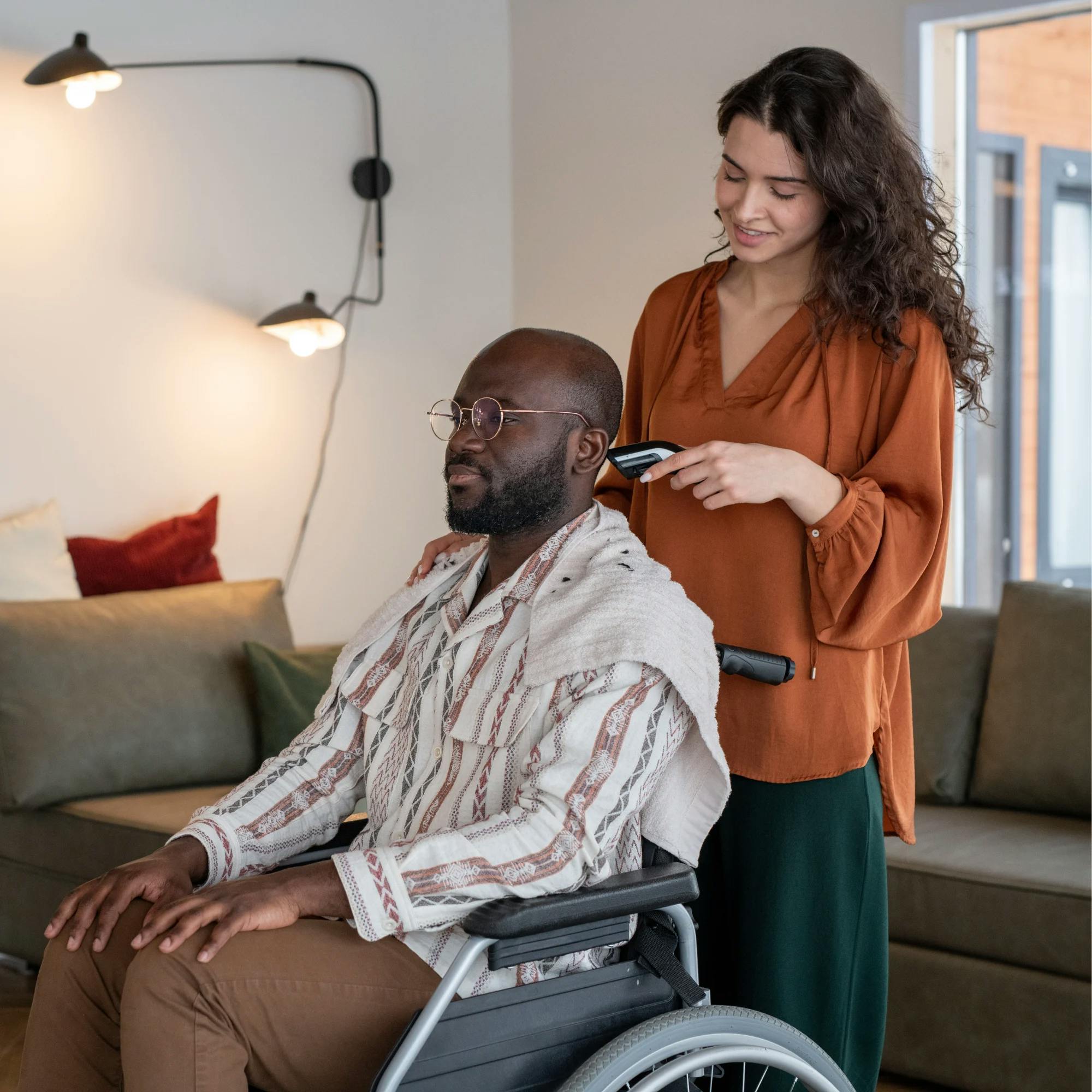Speech therapy can be a huge part of recovery for a person with a brain injury. The brain is an extremely complex organ with many parts. Each part is responsible for certain functions, such as walking, talking, and eating. The brain also coordinates our heart rate, circulates our blood, and regulates our breathing. I think of each person’s brain as an incredible snowflake. It’s unique in its own way and constantly evolving depending on its environment.
Unfortunately, at least 3.6 million people in the United States experience a brain injury each year, according to the Brain Injury Association of America. And depending on where in the brain the injury takes place, speech and other aspects of communication may be impaired. For instance, a person’s speech may become slurred, or they may have difficulty finding the right words to say. No two brain injuries are alike, and recovery varies greatly depending on the person’s personality, their preinjury skills, and the severity of the brain injury itself. But a speech-language pathologist can play an instrumental role in helping a person regain their ability to communicate.


2 types of brain injuries
There are two types of brain injuries: acquired and traumatic.
An acquired brain injury (ABI) results from an internal force on the brain. Some examples of an ABI include:
Pressure on the brain from a tumor
Lack of oxygen
Aneurysm
Heart attack
A traumatic brain injury (TBI) happens when an external force hits the head and makes the brain move inside the skull or damages the skull, which damages the brain. Some examples of a TBI include:
Falls
Assaults
Car accidents
Sports injuries
Without getting too much into neurology, there are four lobes of the brain: parietal, occipital, temporal, and frontal. Each lobe controls a specific function; for example, the occipital lobe is responsible for vision. If the brain injury occurs on the frontal or temporal lobes of the brain, it can result in memory loss, confusion, poor organizational reasoning and judgment skills, and disinhibition, or the inability to stop inappropriate behavior. This injury can drastically change a person, and it’s often difficult for others to understand why they’ve changed, since the injury is invisible to the eye.


How does speech therapy help a person with a brain injury?
A speech-language pathologist is part of a team of professionals supporting the patient’s recovery. There are several ways a speech therapist can be involved in the recovery process.
First, the speech therapist will evaluate the patient to determine the right treatment plan for them. The plan will be individualized and depend on where the person is in their recovery process. The main goal is to increase the person’s independence in every aspect of their life.
In the early stages of recovery, especially if the patient is in a coma, speech therapy focuses on helping the person respond to sensory stimulation. The speech-language pathologist also teaches the person’s caregiver and other family members how to communicate with their loved one.


When a person with a brain injury awakens from their coma or becomes more aware, speech therapy helps orient the person to where they are and what’s happened to them.
Once the person has progressed in recovery, whether they’re still in rehabilitation or back at home, treatment targets the best ways to:
Improve memory, such as through journaling
Relearn ways to problem-solve, such as figuring out how to pay bills
Regain organizational skills, such as making appointments
Improve self-monitoring skills, which might include one’s body language and what one says to others
Eventually, speech therapy may include helping the person work with a job coach to get back to work, or run an errand using compensatory strategies to help, such as organizers or checklists.
There are many everyday skills that can be affected by a brain injury. While the speech-language pathologist’s main goal is to improve the person’s communication skills, a brain injury can also impact facial expressions, chewing and swallowing, and more. A person with a brain injury may have a resulting impairment such as dysarthria, aphasia, apraxia, or poor executive functioning. A speech therapist can help with all of these!


What is dysarthria?
Dysarthria is a speech disorder caused by muscle weakness from a brain injury. A person with dysarthria will slur their speech, speak too slowly, and sound as if they’re mumbling. The main goal of speech therapy is to improve the person’s intelligibility so others can understand them. Exercises to help a person with dysarthria include strengthening breath support, improving tongue and lip coordination, and improving overall power in the mouth, jaw, tongue, and throat.


What is aphasia?
Aphasia is a language disorder resulting from damage to the parts of the brain that process and produce language. A person diagnosed with aphasia may have difficulty finding the words to say, understanding what’s said to them, reading, or writing. There are several types of aphasia, and it can range from mild to severe, where the person can’t communicate at all.
Speech therapy focuses on improving communication and language skills, while using other modes of communication if needed and using compensatory strategies during tough moments. Exercises that may help include reading/writing exercises, listening to and repeating words, and relearning how to use facial expressions effectively.


What is apraxia?
Apraxia is a neurological disorder that makes it difficult to complete familiar movements on command, such as tying a shoe or pouring a drink. Even if the person understands the action and wants to participate, they can’t perform the action consistently, and sometimes even at all.
Like aphasia, there are several forms of apraxia. Some types affect the ability to make movements with the arms, legs, or eyes, or to coordinate activities such as getting dressed. Buccofacial apraxia affects speech and is also known as verbal apraxia. It consists of difficulty coordinating mouth and speech movements. Speech therapists treat this by working on speech sound production and prosody (the patterns and rhythm of how we speak). They can also teach the person how to use an augmentative and alternative communication (AAC) device if they can’t express themselves clearly.


What is executive functioning?
Executive functioning is a group of cognitive skills including attention, working memory, inhibition, and problem solving. Someone who has impaired executive functioning will have difficulty completing tasks, organizing multiple steps of a process into the right order, or keeping their things organized. In addition, they may have a hard time controlling their impulses or emotions. A speech-language pathologist will target those areas in speech therapy by using audio and visual feedback, teaching the person to relearn nonverbal gestures, and more.


Speech therapists share their expertise and encouragement
The journey of recovery after a brain injury is ongoing, and it requires many different professionals. It can make a big difference to have a dedicated team supporting you and cheering you on. Here’s how a few of my colleagues at Expressable describe the care they provide.
“One thing I’d like someone with a brain injury to know is that while speech therapy isn’t necessarily going to be easy, the brain is a miracle muscle, and there is progress to be made. That progress may be incremental, but the moments of success are so incredible,” says speech-language pathologist Kaylee Onderko, M.S., CCC-SLP. “Even after an injury, your brain retains its neuroplasticity–the ability to change, adapt, and function. That neuroplasticity is key to building new neural connections, which is exactly what you need to do after a brain injury.
“The takeaway here is that there is hope,” Onderko adds. “With the right professionals on your team, that hope can be transformed into measurable progress.”
“An important thing I consider when working with people with brain injuries is that simple, daily living tasks may take additional time for them,” explains speech-language pathologist Yadira Cantu, SLPD CCC-SLP. “I take the time to learn about their difficulties and learn how to best advocate for them.”
Through my work with people recovering from a brain injury, I know how challenging the journey can be. There may be days when you feel so exhausted that one simple task is the only thing you can accomplish, and that is OK! As a speech-language pathologist, I encourage my patients not to cancel a therapy session on days when they’re tired. Let your speech therapist know how you’re feeling. They will be gentle and meet you where you are that day. It’s better to have a little bit of speech therapy than nothing at all!
Speech therapists can help with problem-solving, word-finding, social skills, clarifying speech, communicating with friends and family, and managing the activities of daily life. As Onderko puts it, “Your speech therapy plan will be individualized to you, with the goal of helping you get back to doing the things you love with the people you care about.”










